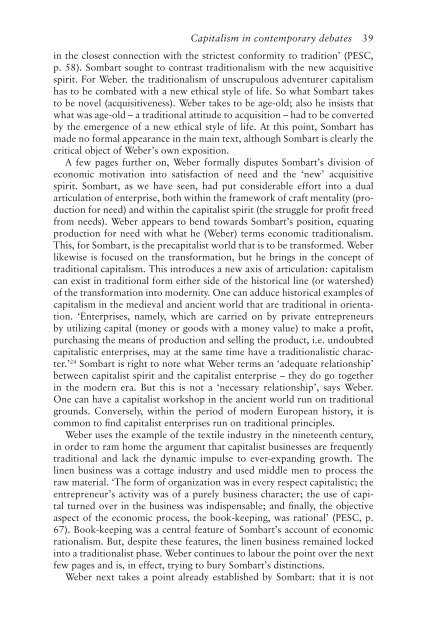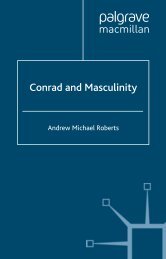Understanding Weber
Understanding Weber
Understanding Weber
Create successful ePaper yourself
Turn your PDF publications into a flip-book with our unique Google optimized e-Paper software.
Capitalism in contemporary debates 39<br />
in the closest connection with the strictest conformity to tradition’ (PESC,<br />
p. 58). Sombart sought to contrast traditionalism with the new acquisitive<br />
spirit. For <strong>Weber</strong>. the traditionalism of unscrupulous adventurer capitalism<br />
has to be combated with a new ethical style of life. So what Sombart takes<br />
to be novel (acquisitiveness). <strong>Weber</strong> takes to be age-old; also he insists that<br />
what was age-old – a traditional attitude to acquisition – had to be converted<br />
by the emergence of a new ethical style of life. At this point, Sombart has<br />
made no formal appearance in the main text, although Sombart is clearly the<br />
critical object of <strong>Weber</strong>’s own exposition.<br />
A few pages further on, <strong>Weber</strong> formally disputes Sombart’s division of<br />
economic motivation into satisfaction of need and the ‘new’ acquisitive<br />
spirit. Sombart, as we have seen, had put considerable effort into a dual<br />
articulation of enterprise, both within the framework of craft mentality (production<br />
for need) and within the capitalist spirit (the struggle for profit freed<br />
from needs). <strong>Weber</strong> appears to bend towards Sombart’s position, equating<br />
production for need with what he (<strong>Weber</strong>) terms economic traditionalism.<br />
This, for Sombart, is the precapitalist world that is to be transformed. <strong>Weber</strong><br />
likewise is focused on the transformation, but he brings in the concept of<br />
traditional capitalism. This introduces a new axis of articulation: capitalism<br />
can exist in traditional form either side of the historical line (or watershed)<br />
of the transformation into modernity. One can adduce historical examples of<br />
capitalism in the medieval and ancient world that are traditional in orientation.<br />
‘Enterprises, namely, which are carried on by private entrepreneurs<br />
by utilizing capital (money or goods with a money value) to make a profit,<br />
purchasing the means of production and selling the product, i.e. undoubted<br />
capitalistic enterprises, may at the same time have a traditionalistic character.’<br />
24 Sombart is right to note what <strong>Weber</strong> terms an ‘adequate relationship’<br />
between capitalist spirit and the capitalist enterprise – they do go together<br />
in the modern era. But this is not a ‘necessary relationship’, says <strong>Weber</strong>.<br />
One can have a capitalist workshop in the ancient world run on traditional<br />
grounds. Conversely, within the period of modern European history, it is<br />
common to find capitalist enterprises run on traditional principles.<br />
<strong>Weber</strong> uses the example of the textile industry in the nineteenth century,<br />
in order to ram home the argument that capitalist businesses are frequently<br />
traditional and lack the dynamic impulse to ever-expanding growth. The<br />
linen business was a cottage industry and used middle men to process the<br />
raw material. ‘The form of organization was in every respect capitalistic; the<br />
entrepreneur’s activity was of a purely business character; the use of capital<br />
turned over in the business was indispensable; and finally, the objective<br />
aspect of the economic process, the book-keeping, was rational’ (PESC, p.<br />
67). Book-keeping was a central feature of Sombart’s account of economic<br />
rationalism. But, despite these features, the linen business remained locked<br />
into a traditionalist phase. <strong>Weber</strong> continues to labour the point over the next<br />
few pages and is, in effect, trying to bury Sombart’s distinctions.<br />
<strong>Weber</strong> next takes a point already established by Sombart: that it is not




